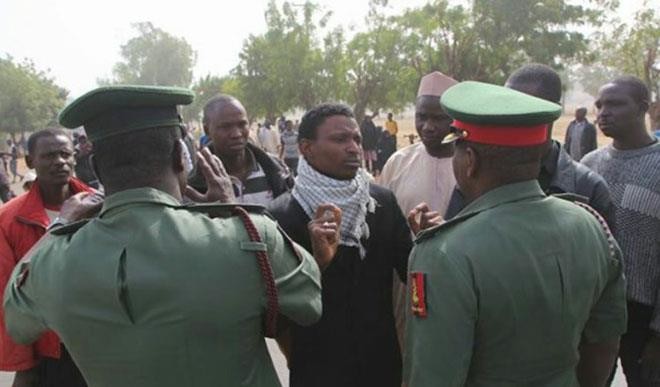Questions about the Army/Shiites clash
Were it been in civilized climes with prime value of human dignity, this week would have been marked a black week in the annals of military/civil relation in Nigeria, thanks to unruly youths. Zaria residents witnessed a terrible encounter, leaving many dead. In war, truth is said to be the first casualty. So, beyond the […]


Were it been in civilized climes with prime value of human dignity, this week would have been marked a black week in the annals of military/civil relation in Nigeria, thanks to unruly youths. Zaria residents witnessed a terrible encounter, leaving many dead. In war, truth is said to be the first casualty. So, beyond the troubling humanitarian concern, we also find ourselves struggling to save the truth from being murdered in the wrestling hands of the Shiites group who said they were peaceful but carried around sticks and local weapons on one hand and the Nigerian military who said all the burning, shelling and killings were to rescue the life of their chief.
But the Shiites denied and maintain that no reasonable person can plan to assassinate the chief of army staff with sticks, machetes and catapults. But the military backed up with pictures and video clips, maintained that no military in this world would bear the affront without retaliating the way they did. At this juncture it may be better to await full disclosure for detailed discourse. But as an academic with research interest in human rights, humanitarian norms and human dignity, one finds it imperative to speak out in principle and on the basis of the few facts available.
I personally cannot afford to remain silent because I love my country and value its unity and justice. I also love this government and the change it stands to represent. For this change has been our aspiration as mirrored by my writings for over than a decade.
Going through different arguments on this sorrowful saga one still finds questions that begs for answers. Can the Islamic movement (or Shiites as they are described) be said to be a peaceful organization? Perhaps they don’t view themselves as violent or offensive but what of their immediate community? Are they not seen by the community as intimidating (if not violent)? If they so constitute themselves into nuisance to fellow community should there not be due process of dealing with the menace? Is this not the difference between the rule of law and rule of men?
Again, bearing in mind the video clips and pictures going around in the web (depicting the senior military officers begging the Shiites to let them pass through the highway and commanding the soldiers to hold fire not to shoot), can that justify what later ensued? Is the Nigerian military bound only by its rules of engagement? Lastly and more importantly, as a nation with no sense of national memory, what lessons do we learn from the whole saga?
Three steps need to be taken:
1. Set-up a neutral panel of inquiry. Let the panel be different from the previous compositions including activities, neutral members and experts with experience in this aspect of the law and conflicts.
2. The inquiry should not only be blame-tracing but must go beyond even this crisis with a view to coming out with directives and new sets of rules to deal with this sort of challenge that is now becoming a trend in line with our human rights commitments and humanitarian norms.
3. Let this be the first litmus test for this government and the change it stands for. Nigerian government and states are not known to implement white papers and reports. The much-needed change here is a swift in-depth analysis and quick report with immediate action (implementation).
Humanitarian norms and human dignity are principles which any country owes to its citizens whether recognized by technical arguments of international laws or national laws.
Suleiman can be reached at [email protected]
